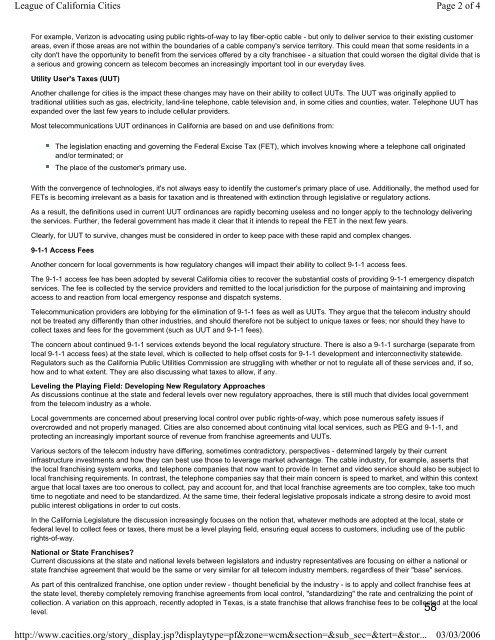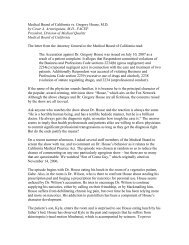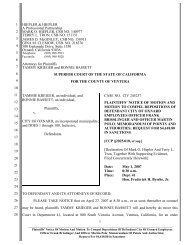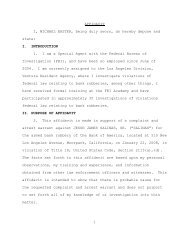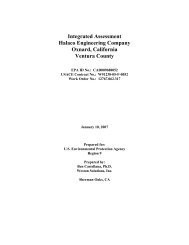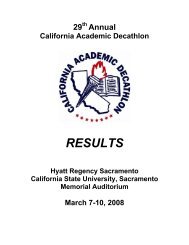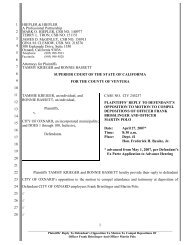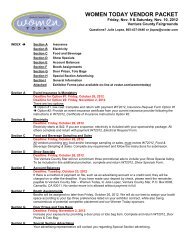MEMORANDUM TO: Board of Directors FROM: Wally Bobkiewicz ...
MEMORANDUM TO: Board of Directors FROM: Wally Bobkiewicz ...
MEMORANDUM TO: Board of Directors FROM: Wally Bobkiewicz ...
Create successful ePaper yourself
Turn your PDF publications into a flip-book with our unique Google optimized e-Paper software.
League <strong>of</strong> California Cities<br />
http://www.cacities.org/story_display.jsp?displaytype=pf&zone=wcm§ion=&sub_sec=&tert=&stor...<br />
Page 2 <strong>of</strong> 4<br />
03/03/2006<br />
For example, Verizon is advocating using public rights-<strong>of</strong>-way to lay fiber-optic cable - but only to deliver service to their existing customer<br />
areas, even if those areas are not within the boundaries <strong>of</strong> a cable company's service territory. This could mean that some residents in a<br />
city don't have the opportunity to benefit from the services <strong>of</strong>fered by a city franchisee - a situation that could worsen the digital divide that is<br />
a serious and growing concern as telecom becomes an increasingly important tool in our everyday lives.<br />
Utility User's Taxes (UUT)<br />
Another challenge for cities is the impact these changes may have on their ability to collect UUTs. The UUT was originally applied to<br />
traditional utilities such as gas, electricity, land-line telephone, cable television and, in some cities and counties, water. Telephone UUT has<br />
expanded over the last few years to include cellular providers.<br />
Most telecommunications UUT ordinances in California are based on and use definitions from:<br />
The legislation enacting and governing the Federal Excise Tax (FET), which involves knowing where a telephone call originated<br />
and/or terminated; or<br />
The place <strong>of</strong> the customer's primary use.<br />
With the convergence <strong>of</strong> technologies, it's not always easy to identify the customer's primary place <strong>of</strong> use. Additionally, the method used for<br />
FETs is becoming irrelevant as a basis for taxation and is threatened with extinction through legislative or regulatory actions.<br />
As a result, the definitions used in current UUT ordinances are rapidly becoming useless and no longer apply to the technology delivering<br />
the services. Further, the federal government has made it clear that it intends to repeal the FET in the next few years.<br />
Clearly, for UUT to survive, changes must be considered in order to keep pace with these rapid and complex changes.<br />
9-1-1 Access Fees<br />
Another concern for local governments is how regulatory changes will impact their ability to collect 9-1-1 access fees.<br />
The 9-1-1 access fee has been adopted by several California cities to recover the substantial costs <strong>of</strong> providing 9-1-1 emergency dispatch<br />
services. The fee is collected by the service providers and remitted to the local jurisdiction for the purpose <strong>of</strong> maintaining and improving<br />
access to and reaction from local emergency response and dispatch systems.<br />
Telecommunication providers are lobbying for the elimination <strong>of</strong> 9-1-1 fees as well as UUTs. They argue that the telecom industry should<br />
not be treated any differently than other industries, and should therefore not be subject to unique taxes or fees; nor should they have to<br />
collect taxes and fees for the government (such as UUT and 9-1-1 fees).<br />
The concern about continued 9-1-1 services extends beyond the local regulatory structure. There is also a 9-1-1 surcharge (separate from<br />
local 9-1-1 access fees) at the state level, which is collected to help <strong>of</strong>fset costs for 9-1-1 development and interconnectivity statewide.<br />
Regulators such as the California Public Utilities Commission are struggling with whether or not to regulate all <strong>of</strong> these services and, if so,<br />
how and to what extent. They are also discussing what taxes to allow, if any.<br />
Leveling the Playing Field: Developing New Regulatory Approaches<br />
As discussions continue at the state and federal levels over new regulatory approaches, there is still much that divides local government<br />
from the telecom industry as a whole.<br />
Local governments are concerned about preserving local control over public rights-<strong>of</strong>-way, which pose numerous safety issues if<br />
overcrowded and not properly managed. Cities are also concerned about continuing vital local services, such as PEG and 9-1-1, and<br />
protecting an increasingly important source <strong>of</strong> revenue from franchise agreements and UUTs.<br />
Various sectors <strong>of</strong> the telecom industry have differing, sometimes contradictory, perspectives - determined largely by their current<br />
infrastructure investments and how they can best use those to leverage market advantage. The cable industry, for example, asserts that<br />
the local franchising system works, and telephone companies that now want to provide In ternet and video service should also be subject to<br />
local franchising requirements. In contrast, the telephone companies say that their main concern is speed to market, and within this context<br />
argue that local taxes are too onerous to collect, pay and account for, and that local franchise agreements are too complex, take too much<br />
time to negotiate and need to be standardized. At the same time, their federal legislative proposals indicate a strong desire to avoid most<br />
public interest obligations in order to cut costs.<br />
In the California Legislature the discussion increasingly focuses on the notion that, whatever methods are adopted at the local, state or<br />
federal level to collect fees or taxes, there must be a level playing field, ensuring equal access to customers, including use <strong>of</strong> the public<br />
rights-<strong>of</strong>-way.<br />
National or State Franchises?<br />
Current discussions at the state and national levels between legislators and industry representatives are focusing on either a national or<br />
state franchise agreement that would be the same or very similar for all telecom industry members, regardless <strong>of</strong> their "base" services.<br />
As part <strong>of</strong> this centralized franchise, one option under review - thought beneficial by the industry - is to apply and collect franchise fees at<br />
the state level, thereby completely removing franchise agreements from local control, "standardizing" the rate and centralizing the point <strong>of</strong><br />
collection. A variation on this approach, recently adopted in Texas, is a state franchise that allows franchise fees to be collected at the local<br />
level.<br />
58


